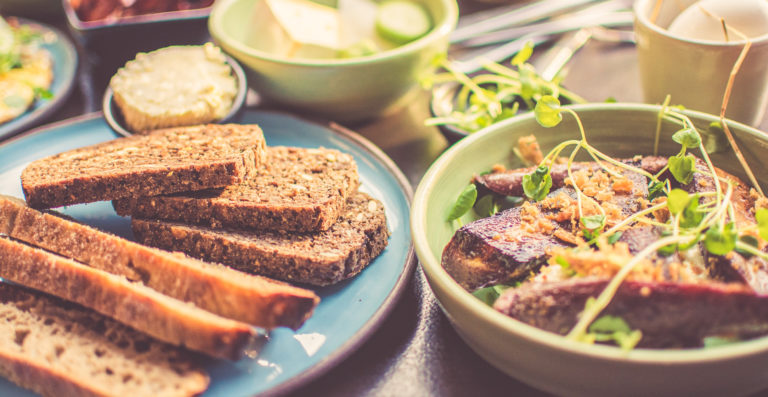
There’s a lot of debate regarding genetically modified foods. Are they as nutritious as non-GMO food? Do they taste the same as the original? Will they be responsible for the onset of the zombie apocalypse? (Am I’m the only one wondering that?)
Many scientists say GMOs are perfectly safe, while many people have raised some pretty heavy concerns about them. I recently read the book The End of Food by Thomas F. Pawlick, which goes into depth about many of the issues facing our current industrialized farming system, the declining nutrient values in our food, how genetically modified foods are affecting the environment, and how those genetically modified foods could affect us. The issues regarding GMOs on our health are the ones that I want to explore here.
As a student of nutrition, I’m compelled to be skeptical about the safety of food that has been genetically modified.
Our bodies want to consume food in its natural state, as fresh and as close to the sun and dirt as possible (minus the actual dirt). There are so many unknown factors regarding GMOs and how our bodies will handle them. They’ve been deemed 100% safe for human consumption by many scientists, and that’s great, but are there other factors we’re not considering? Is ‘100% safe‘ enough? Deep fried butter and root beer floats are considered perfectly safe too, but they should in no way be considered healthy. Also, what’s the cost to our environment? How do GMOs affect animal-life and the surrounding non-GMO plant-life?
Here are a few of the possible problems we face with GMOs, as detailed in The End of Food.
How GMOs Could Affect Our Health
Toxicity
Some FDA scientists indicate that the genetic engineering of food may increase levels of naturally occurring toxicants (man-made toxins), and can cause the appearance of brand new toxicants. There may also be undesirable alterations in the level of nutrients. Basically, the concern here is that GM foods could become toxic; which would not be a good thing.
Allergies
FDA scientists have also indicated that GM foods could “produce a new protein allergen” or “enhance the synthesis of existing plant food allergens”. In other words, without a GM label on foods that have been, people with certain allergies could be harmed by the food they eat.
Antibiotic Resistance
Apparently, many GM foods have antibiotic resistant genes, which means that people who eat them can become more susceptible to bacterial infections.
According to the British Medical Association, antibiotic resistance is “one of the major public health threats that will be faced in the twenty-first century.”
Immuno-suppression
Scientists have claimed that, through animal testing, they have linked GM foods to immuno-suppression (suppression of the body’s immune response).
How GMOs Could Affect Our Environment
One of the scarier things about GM foods is that they have the potential to be dangerous to whatever physical environment they are introduced in. GM crops are man-made mutants, and therefore have no counterparts in nature. This means the natural world around them has had no opportunity to develop any sort of natural controls or defenses that would normally keep other species in balance with the other forms of life in the area. This could mean it’s possible for the genetic traits carried by the GM plants to be transferred to wild or domestic relatives of the GM plant species.
In Conclusion
GMOs are scary because there are still so many unknowns, and even though they’ve been deemed safe by multiple scientists, there are still many factors which we don’t fully know the consequences of yet, and might not for decades. In the past, many things have been labelled ‘safe’ and ‘healthy’ that later turned out to be the exact opposite like cigarettes, tapeworm diets, lobotomys, etc., so maybe it’s good to have a healthy skepticism of GMOs, at least for now. (Or until that whole zombie apocalypse thing actually happens)
What are your thoughts on the GMO debate? Do you feel comfortable eating foods that have been genetically modified, or are you worried about the potential risks involved in eating them? Let me know in the comments below!





Leave a Comment